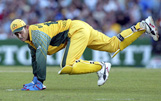COACHING
Wicketkeeping in One-Day Internationals
Most cricket-lovers are aware that a wicketkeeper is under far more pressure in the shorter variety than in the longer version. The wicketkeeper in a one-day game is a guide of sorts. As the overs tick away and the pressure to score mounts, the batting side starts taking risks, thereby increasing the chances of run-outs. In the slog overs, batsmen will try to pinch a run off every ball, irrespective of whether the cherry has hit the bat or pad or even neither. These facts make the keeper's responsibility a multi-faceted one. Not only does he have to perform to the best of his abilities, but he also has to constantly pep up his teammates, and encourage them not to give anything away in the field.The basic responsibilities of a keeper in ODIs are:
1) To head the fielding efforts.
2) To advice and encourage the bowlers.
3) To act as the captain's closest confidant.

Adam Gilchrist - Excellent wicketkeeper and 'chirper'!
A wicketkeeper who essays all these roles deserves
to be considered the most valuable player in the
side, for the performances of the team are bound to
improve as a result. He is the busiest 'fielder' on
the ground, as he is the one who comes into contact
with the ball more than any other individual. He
also gets more opportunities than any other player
to turn the match in his side's favour. His
position behind the stumps also puts him in the
best position to monitor and coordinate the efforts
of his teammates.
He also gets more opportunities than any other player to turn the match in his side's favour. His position behind the stumps also puts him in the best position to monitor and coordinate the efforts of his teammates. An effective keeper will help his captain to align the fielders and detect weaknesses in an opposition batsman. The keeper is best placed to ascertain whether a particular batsman is moving his feet well or timing the ball properly. He is in the best position to be able to judge the line and length of the bowlers and tell them whether they are pitching it in the right areas and how they can improve.
It's the keeper's duty to maintain the enthusiasm of his colleagues and prevent them from dropping their shoulders in a rough phase. One also needs to be endowed with the right attitude to observe a chink in a batsman's armoury and convey the same to the bowler. A rookie like Mahendra Singh Dhoni for instance should be assertive enough to walk towards an experienced campaigner like Anil Kumble and 'advise' him. There can be no greater pleasure for a keeper than his suggestion being accepted and yielding rich dividends.
Another enjoyable part of keeping is the 'chirping', practised generally to incite the batsman. Adam Gilchrist is someone who 'chirps' a lot, especially when the wickets are not falling or the batmen are dominating.
Captaincy is a Herculean task. It isn't humanly possible for a captain to know or follow everything that is happening on the field. This is where the keeper comes in. He can make suggestions on bowling and field changes. Most captains do give weightage to their keeper's point of view. After all, he has the best on-field view of the proceedings! Unfortunately, the keeper's position is being taken for granted in recent times. The paucity of all-rounders, and the resultant need to pack the side with an extra bowler or batsman to 'get the balance right', have led to needless meddling with the keeper's slot. Batting ability matters more than keeping proficiency. This approach does not produce wicketkeepers, but 'glovemen'. By the time one realises the importance of a genuine keeper, the damage has already been done in the form of a defeat in a key game or series. But this makes no difference. How many times in the recent past has the Indian team found itself in this situation? I suppose everybody knows the answer.
The onus is on cricket's governing bodies, as also the coaches and cricketers themselves, to restore genuine wicketkeepers to their rightful place. So guys, please put on your thinking caps and take the right decision!